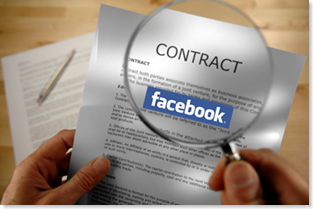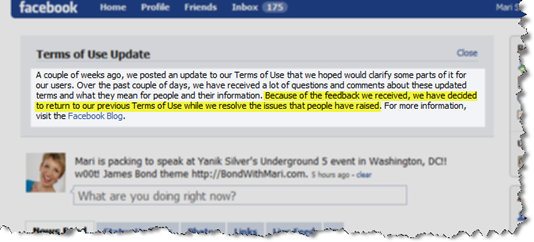Does Facebook Really Own Your Data? NO! It’s About Openness
BREAKING: UPDATE: February 17, 2009, 11:20 PM Pacific
I just logged into Facebook and they have this update posted right there on the Home Page announcing they’ve decided to revert back to the previous Terms of Use while they “resolve the issues that people have raised”:
Way to go Facebook members for speaking out and being heard. Hopefully we’ll see more clearly worded TOS.
[Original post follows]
 I’ve been watching the hoopla and panic on the web and in the Twitterverse today regards Facebook‘s recently (slightly) revised Terms of Use.
I’ve been watching the hoopla and panic on the web and in the Twitterverse today regards Facebook‘s recently (slightly) revised Terms of Use.
The main change folks are reacting to is the perception that everything you load to Facebook suddenly belongs to Facebook. Not so.
The moment you sign up for an account on Facebook, you ARE agreeing to their Terms of Use, which includes a clause that you grant Facebook a license to use your content.
Yes, the license is “irrevocable, perpetual, non-exclusive, transferable, fully paid, worldwide (with the right to sublicense).” Phew, we can see why so many members are upset because of all the implications and permutations this clause could mean.
And, yes, it does seem unfair to have members sign up for a service under one set of Terms and then to change them sitewide, even if moderately. As Facebook’s Corporate Counsel for Commercial Transactions, Suzie White, explained Facebook are working on consolidating their Terms.
Interestingly enough, I raised this very issue last month when I attended the Affiliate Summit West in Las Vegas where one of the panels addressed legal matters in social media. Slides included screenshots of the TOS of giants like Facebook, MySpace, YouTube etc.
At Q&A time, I got up to ask a question on the mic, posed to one of the attorneys, specifically about Facebook’s Terms of Use – I asked if we are to interpret the TOS literally, Facebook are at complete liberty to do as they please with all users’ content.
Indeed, the attorney confirmed this to be the case. BUT, he quickly added words to the effect of: Facebook would be HIGHLY unlikely to ever utilize member content in any way inappropriate such that it would jeopardize the member experience of trust, safety and privacy. (Otherwise, they might just have a class action on their hands, yes?!)
See Facebook CEO and Founder, Mark Zuckerberg response to the outcry today: On Facebook, People Own and Control Their Information.
Excerpts:
Here’s the way I look at it:
1. Much as I’m one of Facebook’s biggest evangelists and I believe they’re here for the long haul, we have to remember there was life before Facebook. Sure it’s great to share a ton of stuff with friends, family, clients, peers around the world. But caveat emptor. Don’t be sharing anything anywhere online that you wouldn’t want exposed publicly in some way. My rule of thumb on Facebook, Twitter and beyond is: “Would I be cool with this showing up on the front page of the New York Times, found in a Google search or seen by my grandchildren in a couple decades’ time??” If ever the answer is no, the data simply does not go online.
2. With all due respect to many of my artist and creative friends in the Facebook community, I really feel photos of your artwork is safe on Facebook. It’s highly unlikely you’d walk into someone’s house one day and see a big coffee table book with your artwork published by Facebook. Believe it or not, Facebook really do care about their members and wouldn’t intentionally do something to upset or provoke their users. Adding a watermark to each image may help you feel safer. DISCLAIMER: I’m not an attorney, I’m not giving legal advice here at all – it’s important always to do your own due diligence.
3. For me, all the content I load to Facebook is for public display anyway: I love it that my photos are propagated around the platform in the feeds. I take photos and load them to Facebook on purpose for more visibility. I love it that my blog posts import as Notes and can be shared around Facebook and commented on. And, all my public videos are on YouTube and imported into Facebook. My status updates, wall posts and comments are all strategically written. I *want* droves of people to be looking at my content – and I invite anyone using Facebook for business networking to consider this strategy too.
4. Another thing, though I share a ton of content online for free, I’m also monetizing my intellectual property with my consulting services, products and training. I believe it is simply not possible to give away all your knowledge. And I highly doubt a third party giant like Facebook would be trying to profit from your IP. Though I don’t doubt they’ll use our data for market research purposes. Again, I’m cool with that as I’m sharing my data on Facebook of my own volition.
Bottom line, I really
encourage the Facebook TOS naysayers to put things in perspective. Facebook are listening. Mark Zuckerberg responded today. He’s had flack before (Beacon!) and has publicly apologized and put steps in place to rectify sticky situations in the past.
Facebook actually consider themselves still a startup! (Even at five years old and 165 million+ active users!) Just shows how much further they plan to go – I do know their #1 focus is growth.
What are your thoughts? Are you more reticent now about using Facebook? Do you think the revised TOS are harsh? How so? Add your comments below.
Related Posts:
- Facebook: All Your Stuff is Ours, Even if You Quit – Mashable.com
- Facebook: Relax, we won’t sell your photos – Cnet News
- Facebook: “We have never claimed ownership” of members’ content – The Standard
- Facebook’s Users Ask Who Owns Information – The New York Times
- Facebook terms of service compared with MySpace, Flickr, Picasa, YouTube, LinkedIn, and Twitter – Amanda French
- Facebook Clarifies Terms Of Service: “We Do Not Own Your Stuff Forever” – Consumerist





Mari, I think this change is an impetus for something we are not yet aware of on the Facebook front. I also think it is sending people into a crazy spin over their rights to their own content. I even had to question whether or not I wanted to upload photos or use the Notes. The thought being what if they did, for some reason, choose to use my content? I get nothing for agreeing to let them share my information outside the site itself. For some reason it makes me think of FOIA or Google dealing with the government requesting data from its servers.
My stance at this point is we agree to the TOS at account signup with the idea that yes, we agree to let Facebook “share” our content on the site, but not to allow Facebook in turn use that content in any way outside the site. If they change the terms of service, which they have the right to do, and they change to the extent shown recently, we as users should have an option to opt out or make some kind of modification to our accounts.
As much as I have grown to like Facebook and its possibilities for me in social networking, I will continue to use the service but with caution and renewed awareness. I have no idea why they all of a sudden decided to change the terms anyway, butmy friends still want to know what I’m up to and when their pictures will be up, haha.
Business as usual. Thanks for the insightful post. Also, thanks for the vote and feedback in my Twtitter poll. You made my dayas my Facebook guru!
I have told several people, several several people! that every word you say online and every picture that you post should be considered public. As you said, if it came up in a google search would you be happy? I also mentioned that I have found myself editing my spoken word in my head before I speak a lot more now – now that I have a blog and that I interact more on public forums.
I’ve seen too many times where private emails aren’t kept private, people Reply To All, instead of just one person and so on. I just do my best to pay attention and only publish content that I want shared.
Excellent article – Thank You.
You wrote: “DISCLAIMER: I’m not an attorney, I’m not giving legal advice here at all – it’s important always to do your own due diligence.”
Since you are self-admittedly one of Facebook’s biggest evangelists, I am curious — did you yourself consult a lawyer to help you decipher the new TOS before you wrote this, or did you just “wing it?”
Thanks for the post Mari. As always, your expertise helps clear away some of the ambiguity. I think that this shoring up of the TOS means that fewer people are going to be as willing to publish their artwork and videos. MySpace has gone through the same process of closing itself up. At first it thought it was positioning itself to squish YouTube but I think it ended shooting itself in the foot.
Good article; however, I did not see what will happen to my content if I decide to end my agreement with Facebook.
I keep noticing the words “highly unlikely,” etc, showing up in this conversation. I’ve written TOU, and I always thought they were designed to eliminate vagueness, not create it. The fact is, when we remove what is “highly unlikely” from the equation, we’re left with the stark truth: if Facebook wants to publish a coffee table book full of pictures of me that I didn’t even upload, they are legally entitled to do so, and I have no recourse, because I agreed to a totally different TOU (if it’s not 100% the same, it’s 100% different) years ago.
What’s worse, they’re not even making any attempt to inform their users of the change – I logged in today and everything was business as usual.
Simply “trusting” that Facebook is better than that isn’t enough. The fact is, they are a business, and they are truly committed to nothing besides making a profit – and with monetization such a sore topic for Facebook, the prospect of selling coffee-table books can only be getting more and more attractive.
Good information, and well written. Sensible thoughts.
Excellent Mari. I think you’re right on, on this issue. They have a lot of motivation to do the right thing. The negative PR if they misused someones content would be huge and very damaging.
Mari,
Basically I agree with you, except for two concerns.
1. If Facebook is ever sold or control comes into other hands than steer the course now.
2. As an artist, I am worried that I am granting rights beyond showing my images. The rights to publish prints, licensing of images and such are very valuable rights.
It is that second point that is causing the uproar. When Facebook extends it rights over time, it touches strongly on copyrights.
I am hoping that we on Twitter & Facebook can attract some non-Facebook legal counsel with expertise in this area to advise us.
Thanks for the post,
Judy Rey
@judyrey
It seems that it would be a bad idea for Facebook to do anything that would harm users’ interests. If they harm their users, they harm the company, after all.